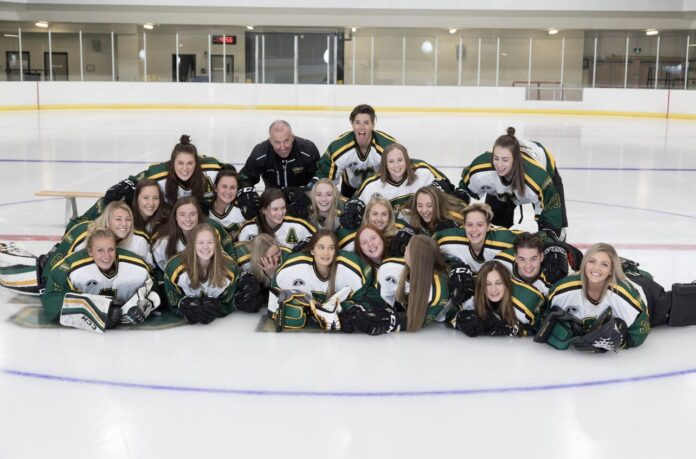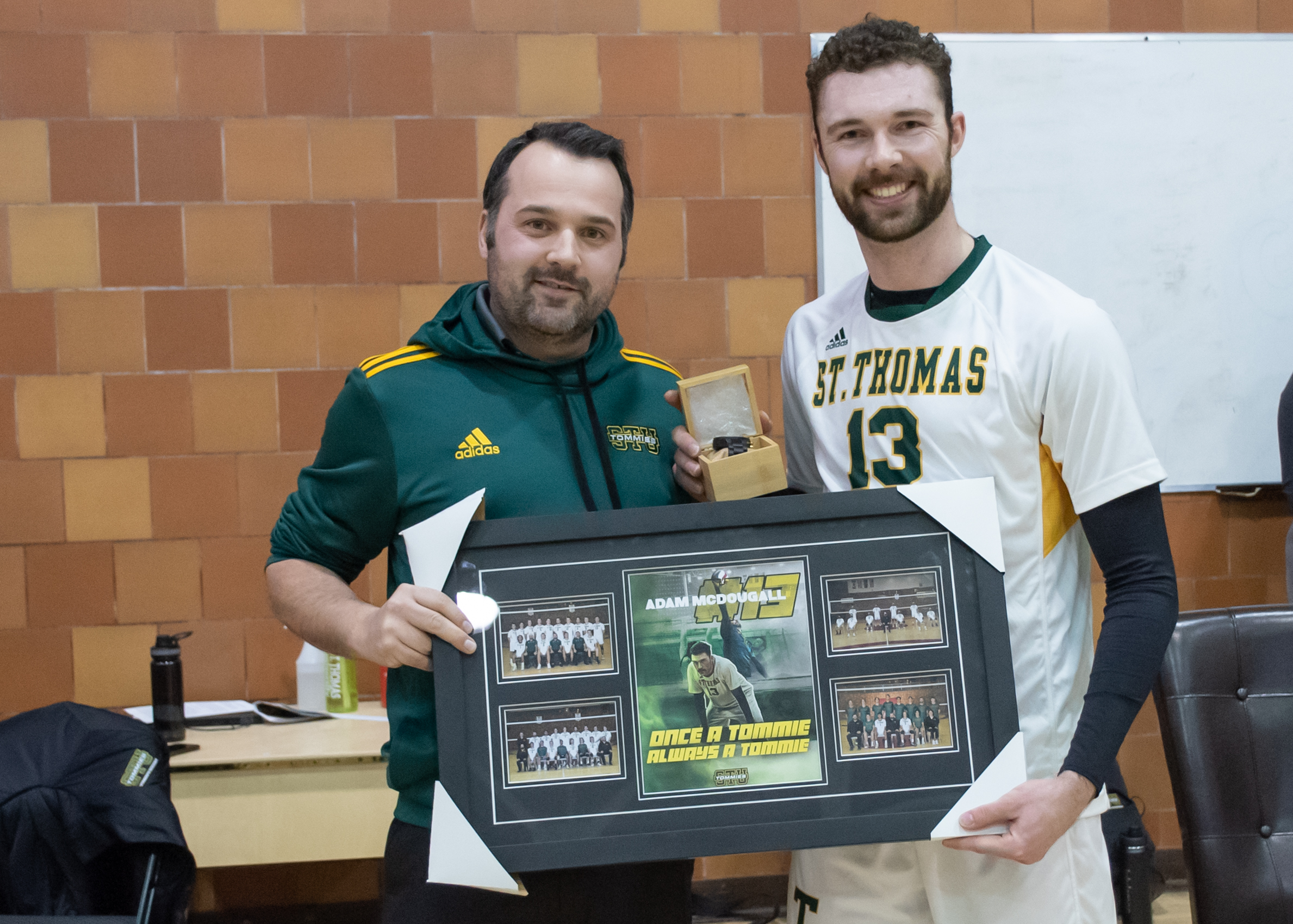
Picture this: graduation rolls around, celebration is in the air, many years of late night studying, presentations, exams, sleepwalking through 8:30 a.m. classes and your degree is done. One of your life goals, working towards a degree, is complete. But what if your goal was something else entirely? What if it was lacing up the skates for the Tommies women’s hockey team or donning the green and gold for the men’s volleyball team?
Leaving sport can be a “grieving process,” said Meaghan Donahue Wies, athletic director at St. Thomas University. Before moving into her new role with the athletics department, she worked with the Atlantic division of the Canadian Sport Institute with their Game Plan program.
The program was born following the Vancouver 2010 Olympics, where Canada won the most gold medals for a host nation in history. Following those Olympic Games, talking about wellness was “unfortunately a very novel idea within our system,” she said.
“The idea behind Game Plan is just a holistic approach to total athlete wellness,” she said. “So treating athletes like more than just medal-winning machines, treating them as people.”
A big part of this wellness work with elite athletes was planning for life outside of sport. She hopes to bring some of those strategies into her work at STU, to bring that awareness to student-athletes and help them prepare.
“I think one of the biggest issues that happens is you’re not expecting it,” she said. “You don’t quite realize just how tied into your identity being an athlete is until you are no longer an athlete at that level.”
For Donahue Wies, one of the keys is being proactive in the situation. Being aware and planning for life after sport while still engaging in it is crucial. For student-athletes, they are effectively doing that by pursuing an education, she said.
“One of the common refrains that I’ve heard is: ‘I don’t know who I am without sport’ and that’s a really scary thing for people to feel.”
This feeling can lead athletes to stay in the sport longer than they wanted or were able to, which can lead to injury and various other problems, said Donahue Wies.
“It’s a grief process … where you feel like you’re losing a piece of yourself and it’s a pretty big piece for most of our student-athletes because they’ve been doing their sports their whole life, sometimes as long as they can walk,” she said.
“It’s been a constant in their lives for two decades really.”
One of her largest coping strategiess is for athletes to remain connected to the sport after they leave, to avoid forgetting “that part of who you’ve been for a really long time.”
For Adam McDougall, the transition was harder than expected. He played four years for the STU men’s volleyball team before graduating in 2023. He moved closer to home to study law at the University of Alberta, where his rigorous academic schedule doesn’t allow for 20+ hours of varsity volleyball a week.

“It’s definitely been harder. I’ve missed it more than I thought that I would and I thought I was gonna miss it a ton,” he said.
The “weird” feeling first struck during the preseason time, when normally, the team would be training and getting mentally prepared for the upcoming season.
“For me, it felt like I almost should be like, ‘okay, I should be getting mentally prepared for the season, I should be getting physically prepared for the season.’ And you’re just not.”
To McDougall, one of the strangest things is going to the gym without teammates and training just to be healthy and active, not to be a varsity athlete.
Doing 30 hours of studying a week on top of classes has both its benefits and its downfalls. While having volleyball was a nice break from school, he also has more time to relax on weekends. However, missing it and being able to watch but not play can be difficult, said McDougall.
To fill that volleyball time, apart from studying law, McDougall will hit the gym and play in volleyball intramurals, albeit at a slower pace than the Atlantic Collegiate Athletics Association level he is used to. On his free weekends, he will lend his time as a volleyball coach, which helps him stay involved in a competitive volleyball environment, he said.
Oh, and he’s still in the team’s current group chat, so no shenanigans are missed.
For Emily Oleksuk, she felt ready to move on with her career after her five years on the STU women’s hockey team. A 2020 graduate, Oleksuk was on the Atlantic University Sport championship-winning team in 2019 and was also the team captain.
The Thunder Bay, Ont. native knew she wanted to move away from home and play varsity hockey, so she moved to Manitoba to play for the now-defunct Shaftesbury High School prep team in Winnipeg. From there she was scouted to play for the Tommies and developed strong relationships in the Fredericton community.
“It’s like you blink and it’s over, it’s unbelievable,” said Oleksuk. “They always say ‘the days are long, but the years are short’ and that’s the most accurate representation of being a collegiate athlete.”
During the winter semester of her last year, a job opened up in the alumni relations department at STU and Oleksuk jumped at the chance. Having a job in place when she graduated helped her avoid the ‘oh my god’ feeling of graduating.
Some of her favourite memories on the team include going to Nationals in 2016 as a rookie and beating McGill at the WinSport arena in Calgary, as well as winning the AUS championship.
After her last game, she remembers crying in a post-game interview at the Aitken Centre. Some of her teammates continued to play after she graduated, but she never felt left out or like she needed to be there.
Instead, it was finding a routine at the gym that proved to be difficult and she took a few years to get into that mindset of not training as a hockey player.
“You have to relearn ‘what do I do on the weekends?” said Oleksuk. “You don’t realize your whole eight months of your hockey year, your whole life is scheduled around when your next game is, when your next practice is.”
“That is your whole life.”
Now, Oleksuk calls herself a ‘superfan’ of the team and was amazed to see how many of the alumni keep up with the team even 10 or more years after graduating.
“I will be forever … I think I’ll always follow the team,” she said.
Oleksuk’s advice for those graduating is to lean into the change and make the most of the connections you have made through the sport.
“This might be the most important chapter of your life, but it also might not be,” she said.
“It might be just the beginning of something new and the great thing about being at STU is that it prepares you for whatever that next chapter is.”
